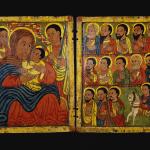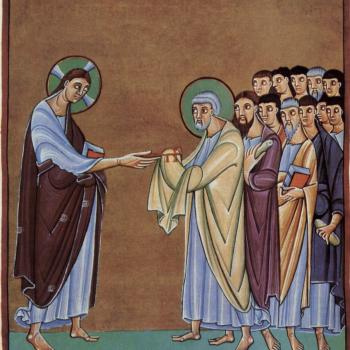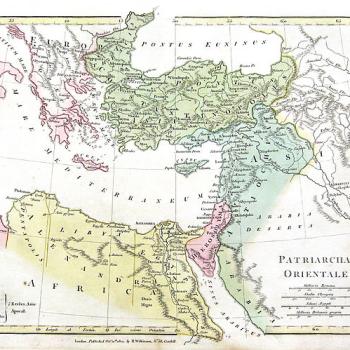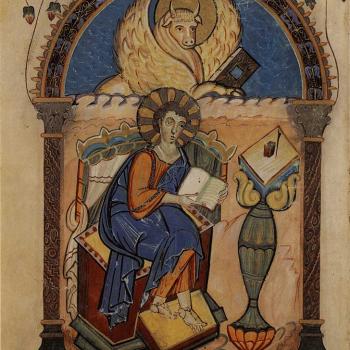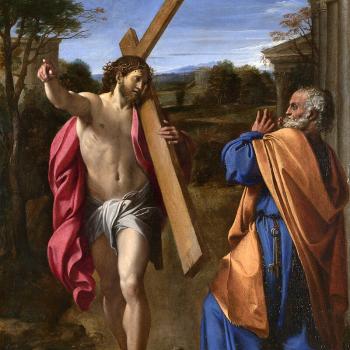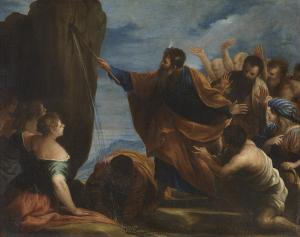
“ [2] And all in Moses were baptized, in the cloud, and in the sea: [3] And did all eat the same spiritual food, [4] And all drank the same spiritual drink; (and they drank of the spiritual rock that followed them, and the rock was Christ.)” (1 Cor. 10, DRB).
A while back I had an exchange on a Facebook group that hosts debate/dialogue between Protestant, Eastern Orthodox, and Catholic Christians. This particular interaction was with an individual who seemed to fit more into the “fundamentalist” camp within Evangelical Protestantism. From memory (and perhaps allowing for a bit of poetic license), this person brought forth 1 Corinthians 10 (above) as evidence that proved that St. Peter could not possibly be the “rock” upon which Jesus built His Church in Mt. 16:18. This of course was not a linguistic argument based upon analyzing the original Greek, but rather one relying on this individual’s belief that only God is referred to as a Rock in Scripture, therefore Mt. 16:18 must necessarily refer to Jesus as the “rock” in that verse. The rest of this post will concern itself with demonstrating that Jesus being the Rock identified by St. Paul in 1 Corinthians 10, and St. Peter being the “rock” that Jesus says He will build his Church upon are not mutually exclusive propositions.
To begin, even if it were granted that every other example of someone being called a rock in Scripture was in reference to God, that would not necessarily mean that St. Peter is not the “rock” in question in Mt. 16:18. It might merely be the one example in Scripture where someone other than God is delineated as such. But that does not seem to be the case, and I pointed my interlocutor to Isaiah 51: 2-3, where Abraham is said to be “the rock whence you are hewn” (DRB). When my opponent tried to deny this fact, I pointed them to a number of Protestant commentaries which agree with that interpretation. They insisted that only God is referred to in Scripture as rock [except for when Peter and Abraham are!][1] And that is more or less where the conversation ended.
What I wish to show below is three examples of Early Church Fathers – in this case fellow Latins – who saw that the facts that the Rock in 1 Cor. 10 refers to Christ, and that the “rock” in Mt. 16 to St. Peter, were in complete harmony. What is more their words are in perfect keeping with a modern Catholic author who noted that “St. Peter’s ‘rock-ness’ is derived from Christ”. In the same vein, another wrote that “God is called rock in Deuteronomy 32:4, and the name is now given to Peter, who shares in God’s rock-ness”. Such was the view of these Latin Fathers as well:
St. Ambrose of Milan (d. A.D. 397):
“Christ is a Rock—for they drank of the spiritual rock that followed them: and the Rock was Christ [1 Corinthians 10:4]. He did not deny the Grace of even this title to His Disciple, so that he is a true Peter [cf. Saint Matthew 16:18; Saint John 1:42], because from the Rock he has the firmness of constancy, the steadfastness of faith”.[2]
St. Maximus of Turin (d. ca. A.D. 465):
“On account of his faithfulness Peter is told… [cites Mt. 16:17-18]. Although he used to be called Simon, then, he is named Peter on account of his faithfulness. We read what the Apostle says of the Lord Himself: ‘They drank from the spiritual rock, but the rock was Christ.’ Rightly, then, inasmuch as Christ is a rock, is Simon named Peter, in order that he who shared with the Lord in faith might be at one with the Lord as well in the Lord’s name – that just as a Christian is so called from Christ, the apostle Peter would similarly receive his name from Christ the rock”.[3]
Pope St. Leo the Great (r. A.D. 440-61):
“For their stability [i.e. the successors of St. Peter] which the rock himself [i.e. St. Peter] was given by that Rock, Christ, he conveyed also to his successors, and wheresoever any steadfastness is apparent, there without doubt is to be seen the strength of the shepherd” (Sermon 5.4).
“[Christ to St. Peter:] Although I am the indestructible rock and the cornerstone … you, too, you are rock for my power strengthens you so that that which I am by my own power will be held in common by you as well by participation” (Sermon 83.1).[4]
On Sermon 5.4 above, Robert Eno writes: “Notice that Leo does not deny that Christ is the primary referent for the rock as symbol but he emphasizes all the more the dignity of Peter who was deemed worthy to share this quality with the Lord”.[5] Thus in the eyes of Catholic commentators—both ancient and contemporary—, there is no inherent contradiction in the Rock of 1 Cor. 10 referring to His chief disciple as “rock” in Mt. 16:18. On the contrary, as the above authors have stated in one way or another, Peter is rock in a derivative sense, and this is from his Master.
[1] Cf. Isa. 51: 2-3, Mt. 16:18.
[2] Saint Ambrose of Milan, Exposition of the Holy Gospel According to Saint Luke, trans. Theodosia Tomkinson (Etna: Center For Traditionalist Orthodox Studies, 2003), 235. NB: Book VI: 97. Cf. https://www.angelfire.com/ny4/djw/ambrose.petrineprimacy.html (accessed 1/29/2023).
[3] St. Maximus of Turin, Sermon 80. In The Sermons of St. Maximus of Turin, trans. Boniface Ramsey, O.P., ACW 50 (New York: Newman Press, 1989), 193. My emphasis.
[4] Pope St. Leo the Great, Sermo 5.4, Sermo 83.1. In Robert Eno, The Rise of the Papacy (Eugene: Wipf and Stock Publishers, 1990), 109. Cf. Eno’s commentary there.
[5] Eno, Rise of the Papacy, 109.


